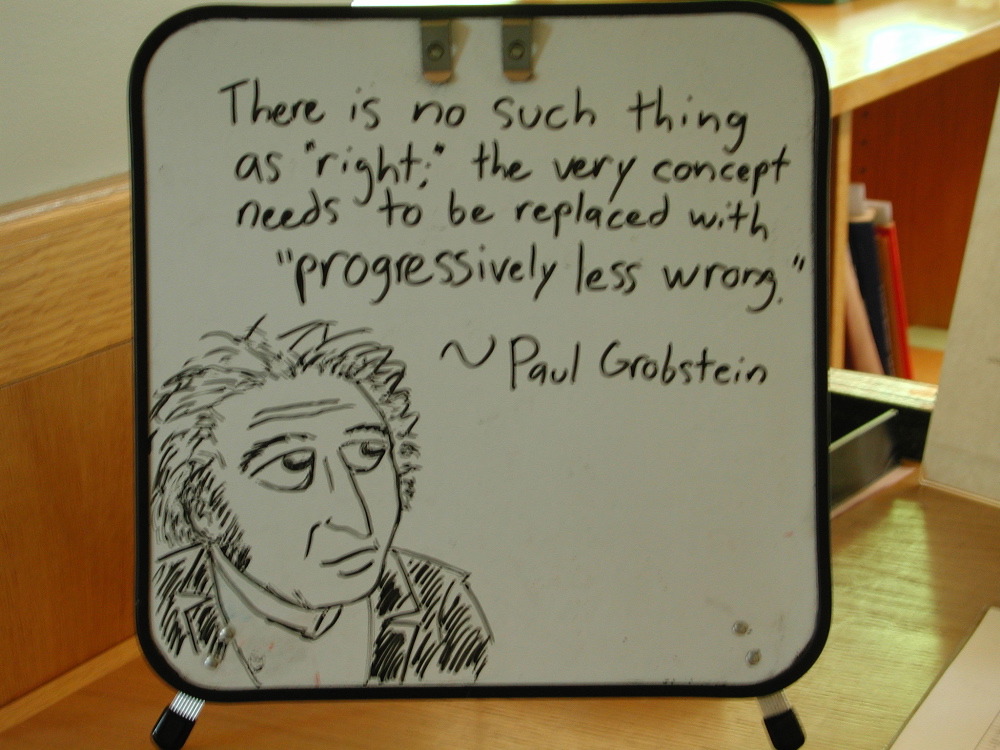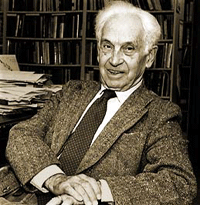Story of Evolution/Evolution of Stories
Bryn Mawr College
January 30, 2007

"Failing Better" at Literature & "Getting it Less Wrong," Scientifically
I. Coursekeeping
--who still needs a book? (Evan, Tamarinda, and ...?)
--who needs help getting on-line/posting in course forum?
--who is in which section for Thursday's small group discussions?
II. Thinking aloud about "failing better" (at writing and interpreting stories) and "getting it less wrong..." (in science)
Some of us found the processes to be usefully analogous:
Lavinia:The more one analyzes a story/poem, the more one finds elements they did not see the first time they read it...evolution..seems simple but the more you analyze, the more you find
Megan: The writer...are constantly revising trying to reach some form of their own truth....scientists are also trying to do the same thing, only with "fact"....Writing itself is getting it less wrong.
Shannon:
I'm glad I read now because I learned some new things that 1) I have always wondered about but never cared or remembered to research & 2) just never occurred to me....I did not, however, quite comprehend all of the aspects addressed in regards to evolutionary biology. I understand the fundamentals of population thinking, essentialism and finalism, but the sub-concept of transmutationism is a bit confusing.
Karen:
It's interesting to think about why some of us think one way, others another, and some in a way completely different....It's interesting to think about what we've (possibly) evolved from.. from the tiniest of particles falling together by chance....the most improbable assemblies do occur...and as it seems..we've got a long way to go.
Mariellyssa: story telling and science...work hand in hand....a hypothesis or a system of observations is similar to the gathering of ideas for a story, a first draft is similar to the implications made as those ideas and observations are brought together, and the revision process...is similar to the collecting of new observations and making corrections to the original observations or ideas.
Elise: It is impossible to faithfully transfer an idea to the page without losing some of that "ineffable" quality that it once had.... I wonder if evolution should not be thought of in the same way.... the inability of evolution to explain the initial impetus for the whole process....modern evolutionary theory...does...remain short of a full explanation
Andrea: not everything concerning evolution makes sense....there are countless holes in the fossil record that scientists are unable to account for. Scientists are constantly trying to connect various species over these gaps...using assumptions/ pure guesses....the concept of evolution creates more nonsense in the study of biology.
Some of us began to push and play with these analogies:Katie: I enjoy puns for the same reason a linguist fears them, the subversion of the integrity of language.... Punning messes with the system... forces me to be more flexible, to be open to multiple meanings/answers at once.... Language is not unlike DNA, the code for biological proteins. ... punning is not unlike genetic mutation - it can enhance or compromise the meaning of a sentence just like a mutation can alter a protein's structure and function.
Laura: The prokaryotes...basically take hunks of genetic information from other types of prokaryotes and transfer this new information in to their genetic code....this...reminded me of stories and their beginnings and development and the "mutations" of genres....Stories build off other stories and the very earliest stories paved the way for more developed stories to exist.
Some of us used the analogy to call both literary critics and scientists to account for their presumptions (and styles)!
Anne : we still feel that there has to be some kind of truth to literature, and that the way to get at that truth is by endlessly analyzing and picking apart passages, and that the people best equipped do do this are literary critics, or English professors or what have you...a sort of scala naturae of the literate world is created; a hierarchy of more perfect and complex organisms, with only those at the top being totally equipped to appreciate literature.
Isabelle: I am struck by how much the story of the discovery of evolution has been simplified since 1859....why is it that the story of evolution has been cut down to just Darwin?...does it run...to a collective desire to think that one man could be his own scientific island?
Sarah: While a literary story most often deals with ones own feelings that he or she has a direct experience of, science deals...with the analysis of something completely outside the analyzers personal experience.... it is interesting to find ourselves most sure about the things we know very little about, and most skeptical about the things in which we know most about....I felt that Mayr was far too focused on getting his assertions correct than less wrong... I also feel that his writing style...is a product of academia's need to argue ones hypotheses as best as possible, leaving as little room for debate as possible.
Tamarinda:
Ernst Mayr...claimed to be professing "facts," things that could "challenge those who are still not yet convinced of the occurence of evolution", while expressing his argument in a manner similar to that of a story teller. I did not feel like I was reading a text book of facts, trying to tatoo different statistics on my mind, but, instead, enjoyed his leisurely and informative progression through history....Mayr seems to be both preaching science while dumbing it down to make it more interesting, and less like a lecture....he tends to leave out some important facts...Mayr...hardly gives enough credit to, the other "fathers of Evolution..."
Katherine:
Through the first three chapters...most references to the scientific method, skirted on the line between the loopy and the linear that we discussed in class....
However, when I reached chapter four, I began to cosider the beliefs that came before Darwin and his revolutionary theories....the creationist believers refused to accept this new, maybe not correct, but certainly less wrong, conclusions...I found myself looking at them...as bad scientists....Perhaps the reason for this, in part, is due to the fear of being wrong.
III. All good preparation for thinking together about Darwin's and Mayr's "novel" versions of What Evolution Is: what sorts of storytellers are these guys?
| Course Home Page
| Forum
| Science in Culture
| Serendip Home |
Send us your comments at Serendip

© by Serendip 1994-
- Last Modified:
Wednesday, 02-May-2018 10:51:46 CDT




